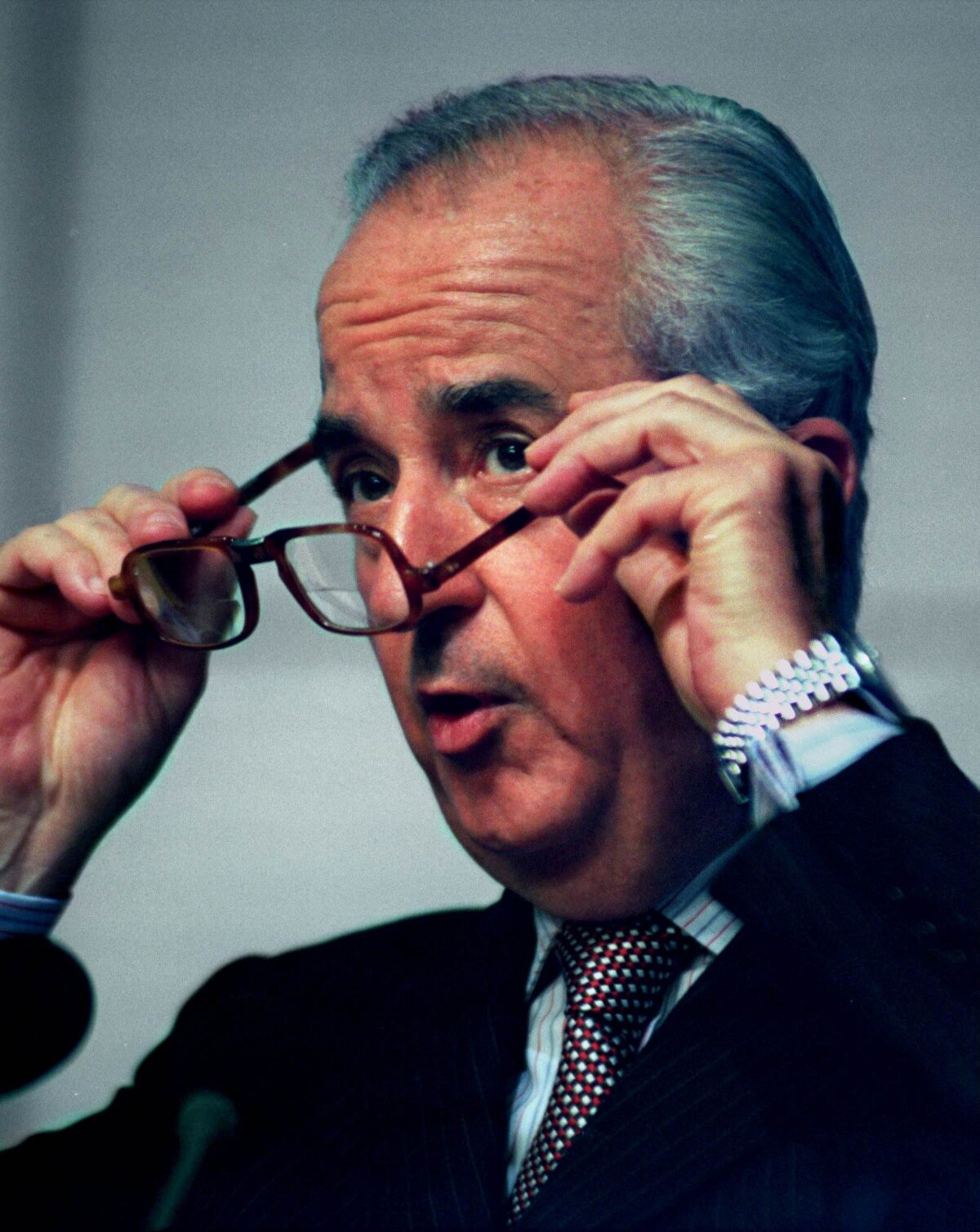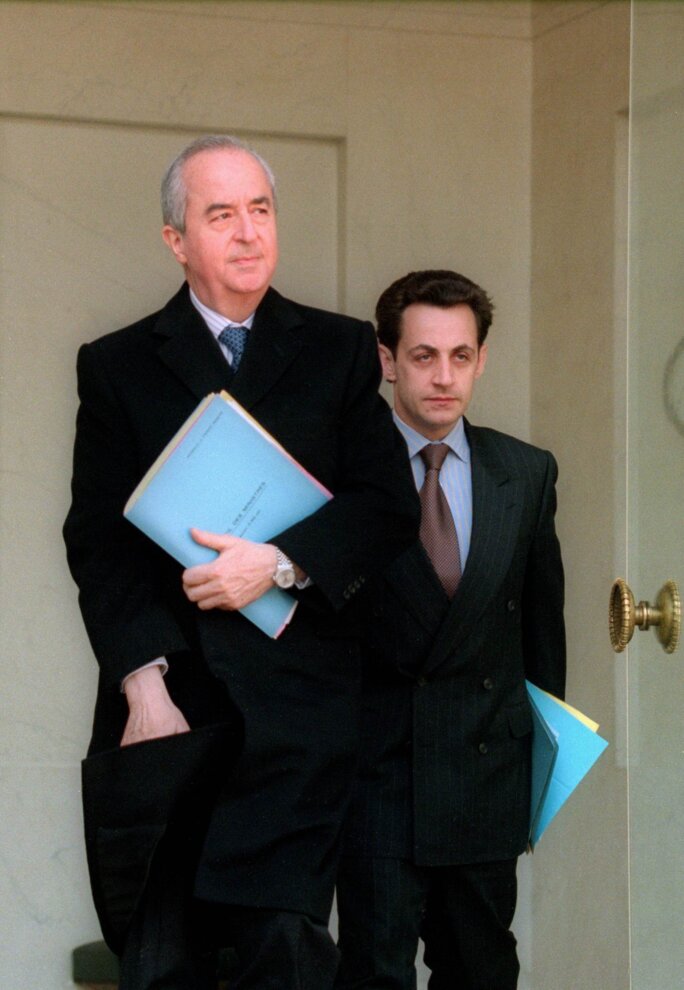A large, complex and costly system was put in place to siphon “commissions” from major French arms deals to use for illegal political funding in France. That is the clear conclusion of a report by the prosecution authorities in Paris into the so-called Karachi affair (1) that dates back to the mid-1990s in France. Prosecutors Chantal de Leiris and Nicolas Baïetto confirm that the system's aim was the “secret funding of French politicians”. The report, a copy of which has been obtained by Mediapart, recommends that six men should stand trial over the affair. These include key aides to three top French politicians in the 1990s, prime minister Édouard Balladur, defence minister François Léotard and Nicolas Sarkozy, who was budget minister at the time.
Following this report it is now up to the two investigating magistrates, Renaud Van Ruymbeke and Roger Le Loire, who carried out the three-and-a-half year probe into the affair to decide whether to follow any or all of the prosecutions' recommendations as to who should face trial. Separately the Cour de justice de la République (CJR), the only body that can try ministers suspected of wrongdoing that arises from their ministerial functions, is considering whether to investigate the role of the aides' political masters. The magistrates have already recommended to the CJR that Balladur and Léotard should be placed under formal investigation, a status in French law that is one step short of being charged. They have also suggested that Nicolas Sarkozy be placed under the status of “assisted witness”, which designates someone judged to be a witness closely connected with the facts of the case and who could potentially face prosecution themselves.
The three former top aides whom the prosecutors say should stand trial are :
- Nicolas Bazire, Balladur's chief of staff when the latter was prime minister and today managing director at the luxury goods group LVMH, who was Sarkozy's best man at his marriage to Carla Bruni in 2008 ;
- Former culture minister Renaud Donnedieu de Vabres, who was at the time special advisor to Léotard at the defence ministry;
- Thierry Gaubert, an advisor to Sarkozy at the time and a friend of the man who would later become French president.
Bazire and Donnedieu are accused of having a role in the setting up by the Balladur government of a vast system to divert “commissions” - which in effect were bribes – on arms deals between France and Pakistan and Saudi Arabia. These became known as “retro-commissions” because part of the sums paid out by the French government were later secretly siphoned back into France. Bazire and Donnedieu, plus Gaubert as well, are also suspected of having secretly “taken delivery of” the diverted funds in order to finance Édouard Balladur's ultimately unsuccessful presidential campaign in 1995. Gaubert's main role is said to have been bringing suitcases of the illicitly-obtained cash into France.
The background to the affair was the political situation in France in the 1990s when Jacques Chirac was earmarked to be the presidential candidate in 1995 for the RPR, the main right-wing party at the time. This left Édouard Balladur, the right-wing prime minister under socialist president François Mitterrand from 1993 to 1995, without the financial backing of a party for his own presidential ambitions. Balladur is suspected of using his role as prime minister to look for alternative sources of funds. Between January and November 1994 his government signed a number of defence deals; four contracts were rapidly concluded in this period, with Pakistan and Saudi Arabia.

Enlargement : Illustration 1

All the deals had one thing in common; even though France was already assured of winning these military export contracts, the Balladur government interposed its own network of intermediaries into the arrangements, led by arms dealers Ziad Takieddine, Abdul Rahman El Assir and Saudi sheikh Ali Ben Mussalam, who has since died. At the time it was known as the “K network”.
In all a total of 327 million euros in secret commissions from the four contracts were promised to the K network, which was “imposed” on the deals by the state authorities, as the prosecutors' report puts it. Indeed, the Paris prosecutors even go so far as to write about a “forced intervention” of the network in relation to the sale to Pakistan of three French Agosta-class submarines in 1994. “If, at the time of these events, it was legal to give commissions to agents of influence whose task was to 'corrupt' those close to political decision makers to encourage the signing of arms contracts, the same is not true of unjustified commissions,” they write.
“The issue in this inquiry is to show that these commissions were fraudulent, by reason of the very aim of these payments, the funding of French politicians. They were unjustified, as the accused network did not intervene to encourage the signing of the arms contracts. They were unjustified, as their primary purpose was the secret funding of French politicians,” says the report.
The prosecutors say that following the long investigation it was clear that “Renaud Donnedieu de Vabre, representing the minister of the defence, and Nicolas Bazire, representing the prime minister, had, with full knowledge of the facts, introduced this unnecessary network”. Their report confirms that the Takieddine/El Assir network was “a network imposed by the political powers in place using fallacious arguments...at a time when the political decision makers of the countries concerned were already being taken care of by the official networks in terms of commissions, and when the contracts were well on the way to being finalised”.
Moreover, the report notes “the intervention by this covert network of Nicolas Bazire and Renaud Donnedieu de Vabre, acting in the name of their respective ministers, is a real act of deception which ultimately proved a major financial cost to the French state”. The unnecessary commissions paid as part of the system imposed by the Balladur government had come out of the public purse.
-----------------------------------------------------
1. In a parallel but separate investigation into the Karachi affair, judges are examining whether the 2002 murders in Karachi of 11 French naval engineers was a revenge attack for the non-payment of commissions to Pakistani officials. After Édouard Balladur's political rival Jacques Chirac beat him to the presidency in 1995, Chirac stopped further payments on the arms contract commissions that Balladur's government had put in place.
Will the former ministers stand trial?

Having dissected how the funds were diverted from arms sales commissions, the prosecutors then turn their attention in the report to the subsequent flow of the money, via cash withdrawals, to its final destination. “These withdrawals of cash, carried out in the greatest possible opacity, to hide their origin and who they were destined for, makes it clear that they were retro-commissions, Ziad Takieddine and El Assir having absolutely no interest in running such risks to move French cash, in particular as they had accounts in France,” says the prosecutors' report.
Chantal de Leiris and Nicolas Baïetto have no doubt as to who benefited from the illicit cash. “The cash withdrawals must necessarily have been for the benefit of those who had authorised the putting in place of the El Assir/Takieddine network, the minister of the defence, represented by his advisor Renaud Donnedieu de Vabre, and the prime minister represented by his chief of staff Nicolas Bazire,” they write.
In total 72,773,000 million francs – about 14.6 million euros in today's money allowing for inflation – was withdrawn from various K network offshore accounts identified by the judicial investigation. The prosecutors believe that Takieddine should be tried under the charge of “aggravated receiving” - in other words receiving goods obtained illegally – for all the monies involved. This is because, they say, he was “the holder of the fraudulent cash that was to be moved into France”.
In the government ranks itself it was Thierry Gaubert, then an advisor to Nicolas Sarkozy's office at the finance ministry, who was responsible for bringing the money into France for the illegal funding of the prime minister. “Thierry Gaubert should be sent for trial under the single heading of receiving – aggravated by being committed regularly – the proceeds of the misuse of company funds in relation to the 6.2 million francs transferred into France to fund Édouard Balladur's campaign,” the report states. The prosecutors also mention the personal receipt of 2.7 million francs and one million Swiss francs. The 6.2 million francs, meanwhile, were later “taken delivery of” by Nicolas Bazire, Balladur's chief of staff and later director of his presidential campaign, who “handed them to the treasurer as representing campaign account receipts”.
As for Renaud Donnedieu de Vabre, he is suspected of having received 250,000 francs personally in cash, and around 40 million francs that were to fill the coffers of the right-wing Parti républicain – Republican Party – presided over by his mentor François Léotard.

Enlargement : Illustration 3

In addition to the recommendations about the judicial fate of the non-ministerial figures in the affair, the prosecutors hint at the judicial reasoning which could spare Nicolas Sarkozy any charges in this case. It is undeniable that Sarkozy was a cog in the system in question, by approving as budget minister the creation of a DCN shell company in Luxembourg through which the K network's hidden commissions over Pakistan were moved, and in authorising, against the advice of his own officials, the payment of an advance on unjustified commissions for one of the Saudi Arabian contracts, known as the Mouette deal. But in both cases the prosecution and the investigating magistrates appear to agree that there is a lack of proof of intent – which is essential in criminal law in such cases – justifying him being placed under formal investigation.
So, for example, in relation to the Mouette contract, which allowed the K network to receive 210 million francs in illegal commissions in 1995 and 1996, the prosecutors impute the crime's intent to a decision made by the prime minister’s office. “The problems raised by the contract were dealt with by the intervention of the prime minister,” they write in the report. In fact, officials from the budget department were strongly against such a dispensation being granted to the intermediaries, but they had to give way in the face of “covering letters from the budget minister of the time [editor's note, Sarkozy]” who, the prosecutors say, was applying a decision made by the prime minister’s office.
In addition to the three political aides, the prosecutors also recommend that three others should stand trial over the affair: Ziad Takieddine and Abdul Rahman El Assir, plus the former head of the international division of the French naval contractor the Direction des constructions navales (DCN – now known as the DCNS), Dominique Castellan. If investigating magistrates Renaud Van Ruymbeke and Roger Le Loire decide to send any or all of the six to stand trial, the case would probably be heard in 2015 - two decades after the events of the case.
Meanwhile the Cour de justice de la République (CJR), which has now received the full content of the investigation by the magistrates, is currently studying the file to see what course of action it will take. As yet they have not opened a formal investigation into the role of the former ministers in the affair. If they do decide to investigate, that could take several more years.
--------------------------------------------------------------------
The French version of this story can be found here.
English version by Michael Streeter


